Here, below is a collection of top ten greatest photos ever taken. Every single one of them has a great story behind. Have a look!
Assassination of Japan Socialist Inejiro Asanuma – 1960
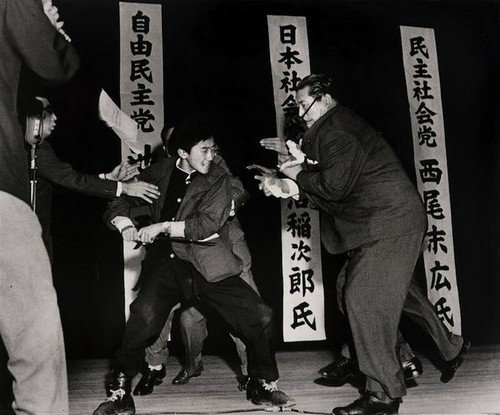
This picture was taken literally a second before the Japanese socialist Party leader Asanuma was stabbed to death on live TV by a right-wing extremist. Photographer Yasushi Nagao, whose modest response was that he was in the right place at the right time, was awarded the Pulitzer Prize for the shot and became one of the iconic photos of the 1960s.The Power of One – 2007
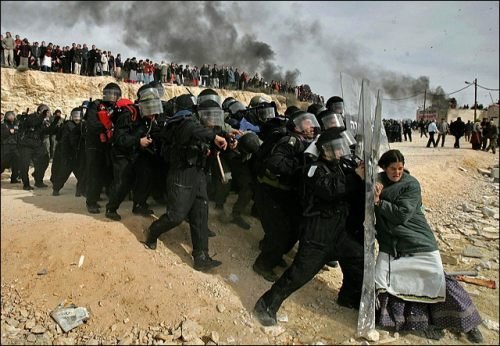
This picture won the Pulitzer Breaking News Photography 2007 award. Photo’s citation reads, “Awarded to Oded Balilty of The Associated Press for his powerful photograph of a lone Jewish woman defying Israeli security forces as they remove illegal settlers in the West Bank.
- Lynching of Young Blacks – 1930
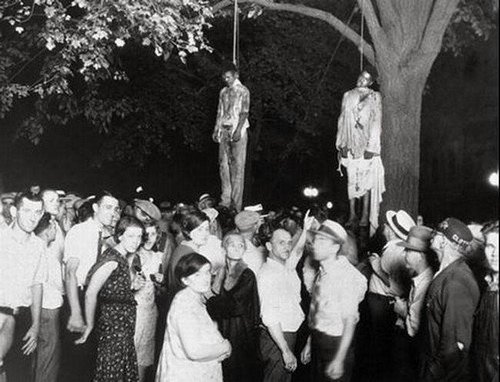
Lawrence Beitler took this iconic photograph on August 7, 1930. It showed the two young black men accused of raping a white girl, hanged by a mob of 10,000 white men. The mob took them by force from the county jailhouse. Another black man was saved from lynching by the girl’s uncle who said he was innocent. The photo sold thousands of copies, which Beitler stayed up for 10 days and nights printing them. The photo was so iconic that it has been the inspiration for many poems, books and songs down the years, “Strange Fruit” by the Jewish poet Abel Meeropol (later sung by Billie Holiday) being the best example.
- Fire on Marlborough Street – 1975
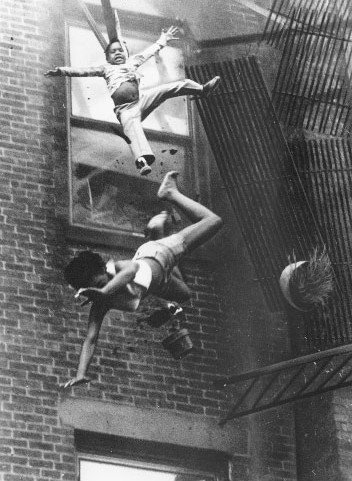
Fire on Marlborough Street is a black-and-white photograph by Stanley Forman which received the Pulitzer Prize for Spot News Photography in 1976 and the title of World Press Photo of the Year. The photograph, which is a part of a series, shows 19-year-old Diana Bryant and her 2-year-old god-daughter Tiare Jones falling from the collapsed fire escape of a burning apartment on Marlborough Street in Boston on July 22, 1975. The photo was taken with a motorized camera. Originally published in the Boston Herald, the photo circulated in over a hundred newspapers and led to the adoption of new fire escape legislation in the United States.
The last Jew in Vinnitsa – 1941
jM7VQmv4oC88mxsZVQ/last-Jew-in-Vinnitsa.jpg)
Picture from an Einsatzgruppen soldier’s personal album, labelled on the back as “Last Jew of Vinnitsa, it shows a member of Einsatzgruppe D is just about to shoot a Jewish man kneeling before a filled mass grave in Vinnitsa, Ukraine, in 1941. All 28,000 Jews from Vinnitsa and its surrounding areas were massacred at the time. 
The “tourist guy” was an Internet phenomenon that featured a fake photograph of a tourist who appeared in many manipulated pictures after the September 11, 2001 attacks. Soon after 9/11 an image showing a tourist while an airliner was about to hit the building beneath him circulated on the Internet. It was claimed that the picture came from a camera found in the debris at Ground Zero. The picture purported to be one taken mere moments before the attacks on the World Trade Center began. The picture won a best 9/11 Photoshopped picture contest.
- Afghan Girl – 1984
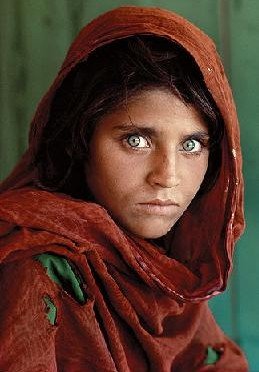
The second most famous photo is Afghan Girl, shot by National Geographic photographer Steve McCurry. Sharbat Gula was one of the students in an informal school within the refugee camp during the time of the Soviet occupation of Afghanistan when she was photographed. The image brought her recognition when it was featured on the cover of the June 1985 issue of National Geographic Magazine at a time when she was approximately 12 years old. Gula was known simply as “the Afghan Girl” until she was formally identified in early 2002. The photograph has been likened to Leonardo da Vinci’s painting of the Mona Lisa and is sometimes popularly referred to as “the Afghan Mona Lisa”.
- Food Theft, 1998
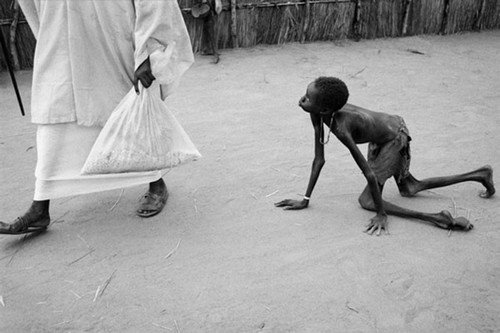
In 1998, yielding to the international pressure, the Sudanese government allowed good aid to be distributed to the south. British photojournalist Tom Stoddart travelled with Medicins Sans Frontieres (MSF) to a camp in Ajiep, where more than 100 people were dying every day. There he took the above photo of a crippled boy who had queued hours for food, only to find it robbed away from him by a fit man who strides confidently away. Source.
- A Walk To The Paradise Garden – 1946
![A-Walk-To-The-Paradise-Garden.jpg]
(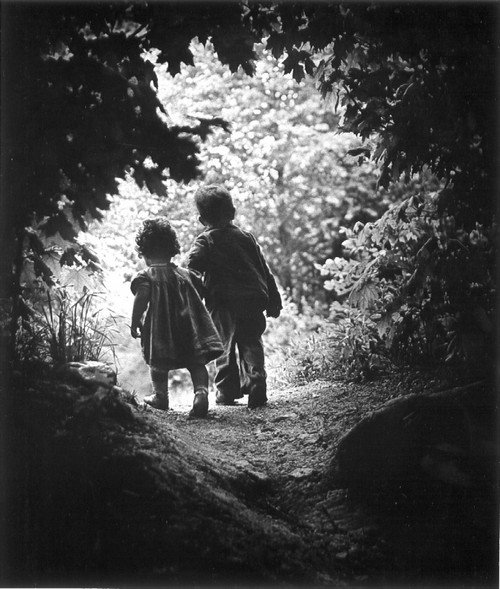 )
)
One of the most iconic photo taken by W. Eugene Smith in 1946. He took this while a walk with his two children, Juanita and Patrick, towards a sun-bathed. In 1955, Smith submitted the photo to Edward Steichen’s now-famous Family of Man exhibit at the MOMA. There, it became a finalist and then the closing image, thus cementing its position as the ur-icon of all family photographs.
- Omayra Sánchez – 1985
![Omayra-Sánchez.jpg]
(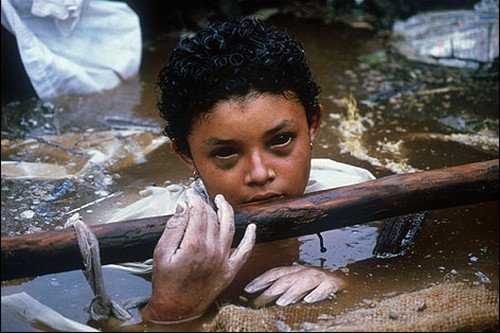 )
)
Omayra Sánchez was a Colombian girl killed in Armero, department of Tolima, by the 1985 eruption of the Nevado del Ruiz volcano, when she was 13 years old. She had been trapped in water and concrete for 3 days. The picture was taken shortly before she died and it caused controversy due to the photographer’s work and the Colombian government’s inaction in the midst of the tragedy, when it was published worldwide after the young girl’s death.
Sánchez became internationally famous through the photograph which was published worldwide and was later designated the World Press Photo of the Year for 1985. Sánchez has remained a lasting figure in popular culture, remembered through music, literature, and commemorative articles.
Hi! I am a robot. I just upvoted you! I found similar content that readers might be interested in:
https://www.glitzyworld.com/top-10-greatest-photos-ever-taken/
Hey loved the article some of these photos are eye open anyways I'm going to follow you keep up the good work I'm a blogger on this site to please check me out if you have the chance and follow please any support helps thanks